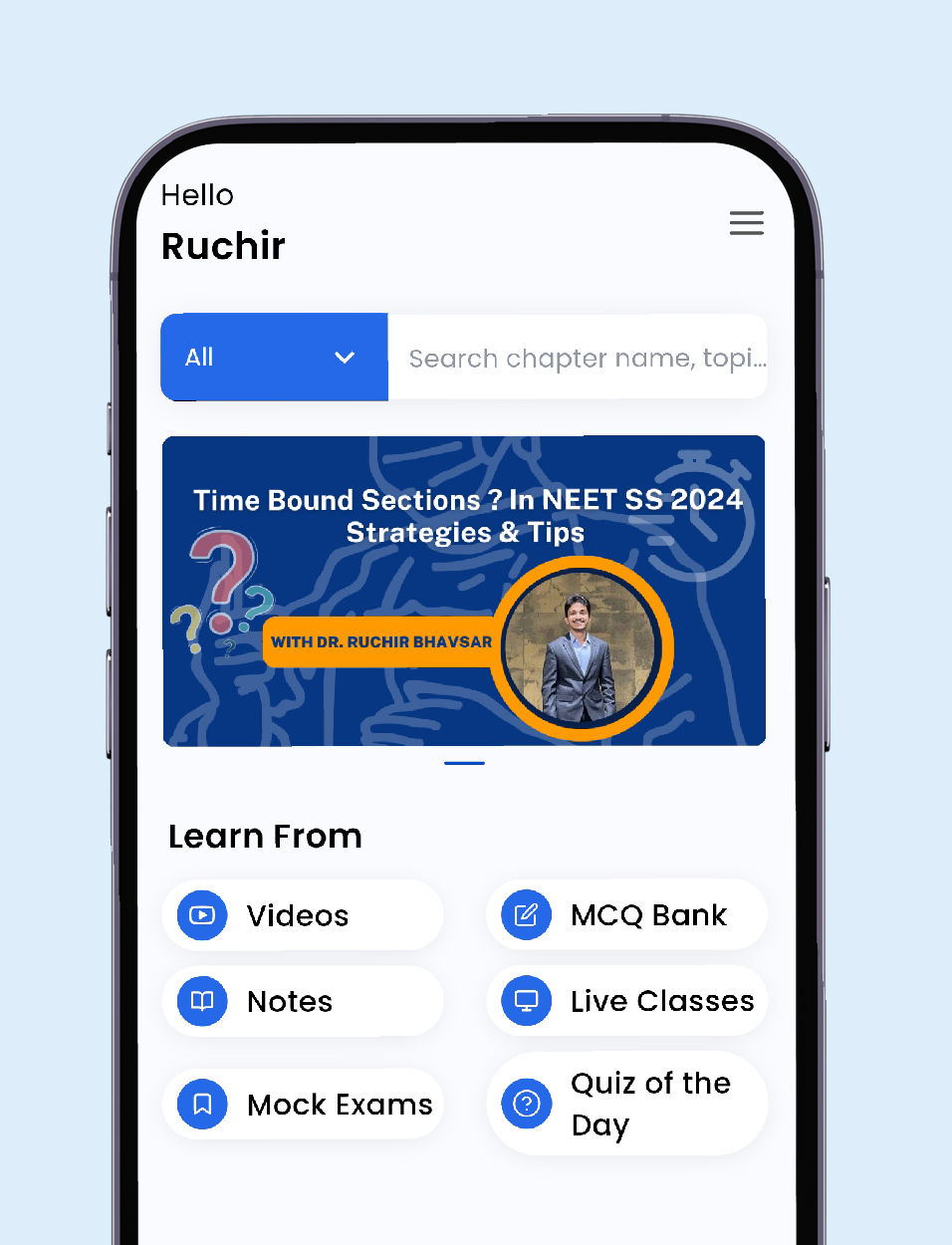By: Dr. Ruchir Bhavsar
Preparing for the NEET SS Surgical Group exam requires a structured plan and disciplined execution. With 120 days to go, this guide provides an optimal strategy focusing on theory, MCQs, mock exams, and scientifically proven techniques like spaced repetition and active recall. Let’s break down the revision roadmap to ensure you maximize your performance.
The Revision Framework
1. Understanding Priorities
- Theory Revision Priorities:
- Priority 1 Modules:
- Module 1: Basic Surgical Principles, Neurosurgery
- Module 2: Perioperative Care, Plastic & Reconstructive Surgery
- Module 3: Trauma, Thyroid
- Module 6: Cardiothoracic Surgery, Pediatric Surgery
- Priority 2 Modules:
- Module 4: Oncology, Breast, Head & Neck
- Module 5: Abdominal Wall, Peritoneum, Bariatrics, Parathyroid, Adrenal, MEN Syndrome
- Module 12: Vascular Surgery
- Priority 3 Modules:
- Module 7: Gastrointestinal Tract (Upper Luminal)
- Module 8: Gastrointestinal Tract (HPB)
- Module 9: Gastrointestinal Tract (Lower Luminal)
- Module 10: Transplantation
- Module 11: Genitourinary Tract
- Priority 1 Modules:
- MCQ Solving Priorities:
- Priority 1: Modules 1, 2, 3, 4, and 6
- Priority 2: Modules 5 and 9
- Priority 3: Modules 7 and 8
- Priority 4: Module 10: Schwartz Insight Quest
- Priority 5: Module 11: ScenarioSift: Clinical Judgment Series
- Priority 6: Module 12: Image-Based Challenge
2. The 120-Day Plan
Phase 1: Foundation Building (Days 1–40)
- Objective: Focus on Priority 1 Modules for theory and MCQs.
- Daily Schedule:
- Theory: 6–8 hours/day reading Priority 1 Modules.
- Use spaced repetition: Review the same topic after 24 hours, 1 week, and 1 month.
- Highlight key points and make flashcards for active recall.
- MCQs: Solve 40–50 questions from Priority 1 Modules daily.
- Analyze solutions, especially for incorrect answers, to identify weak areas.
- Mock Exams: Attempt one full-length mock exam every 1 – 2 weeks. Use these to benchmark your progress.
- Theory: 6–8 hours/day reading Priority 1 Modules.
Phase 2: Conceptual Build-Up (Days 41–80)
- Objective: Transition to Priority 2 Modules while revisiting Priority 1 topics.
- Daily Schedule:
- Theory: 6–7 hours/day with a 70-30 split between Priority 2 and Priority 1 Modules.
- Use Pomodoro Technique to maintain focus.
- Integrate Priority 1 notes into your study routine for spaced revision.
- MCQs: Solve 40–50 questions from Priority 2 Modules, with 10–15 from Priority 1 for retention.
- Mock Exams: Increase frequency to one exam every 10 days. Conduct detailed post-mortems to fine-tune your strategy.
- Theory: 6–7 hours/day with a 70-30 split between Priority 2 and Priority 1 Modules.
Phase 3: Intensive Practice (Days 81–100)
- Objective: Focus on Priority 3 Modules while reinforcing Priority 1 and 2 concepts.
- Daily Schedule:
- Theory: 5–6 hours/day prioritizing Priority 3 Modules, reviewing Priority 1 and 2 briefly.
- MCQs: Solve 50–60 questions daily, covering Priority 3 Modules primarily, with some from Priority 1 and 2.
- Mock Exams: Attempt one exam every week. Use time analytics to improve speed and accuracy.
Phase 4: Peak Performance (Days 101–120)
- Objective: Final revisions, mock exams, and high-yield topic focus.
- Daily Schedule:
- Theory: 4–5 hours/day focusing on high-yield topics across all priorities.
- Condense notes into quick-reference sheets for last-minute revisions.
- MCQs: Solve 60–70 questions/day, mixing high-priority and weaker areas.
- Mock Exams: Attempt 1 exam per week, focusing on simulating real exam conditions.
- Theory: 4–5 hours/day focusing on high-yield topics across all priorities.
3. Scientific Techniques for Revision
- Spaced Repetition:
- Use apps like Anki or physical flashcards to systematically revisit topics.
- Schedule reviews at progressively longer intervals to reinforce long-term memory.
- Active Recall:
- Quiz yourself after studying a topic.
- Avoid passive rereading; instead, test your knowledge through MCQs or by teaching the concept to a peer.
- Focused Practice:
- Prioritize weak areas identified through mock exams and MCQ performance analytics.
- Dedicate 20–30 minutes daily to challenging topics or concepts.
- Visualization:
- Use diagrams, flowcharts, and mind maps to link complex concepts.
- For surgical techniques, supplement theory with videos for better understanding.
4. Mock Exams: A Critical Tool
- Frequency: Begin with biweekly exams, moving to weekly and finally bi-weekly in the last month.
- Analysis: Post-exam reviews are crucial. Focus on:
- Accuracy (aim for >80% correct responses).
- Time management (target 45 seconds per question).
- Question pattern recognition (frequently tested areas).
5. Time Management Tips
- Daily Breakdown:
- Theory: 60% of study time.
- MCQs: 30% of study time.
- Mock Exams: 10% of study time.
- Weekly Off Days: Take one half-day off each week to recharge.
6. Motivation and Mindset
- Celebrate small victories, like completing a module or improving mock test scores.
- Stay consistent; even small, regular efforts yield big results.
7. Key Takeaways
- Prioritize Smartly: Focus on high-yield modules first.
- Be Consistent: Follow a structured plan daily.
- Review Strategically: Use spaced repetition and active recall.
- Practice Diligently: Solve MCQs and attempt mock exams regularly.
- Stay Positive: Believe in your preparation and progress.
With these strategies, you can conquer the NEET SS Surgical Group exam. Follow this plan diligently, adapt it to your pace, and let your hard work shine on exam day. All the best!







